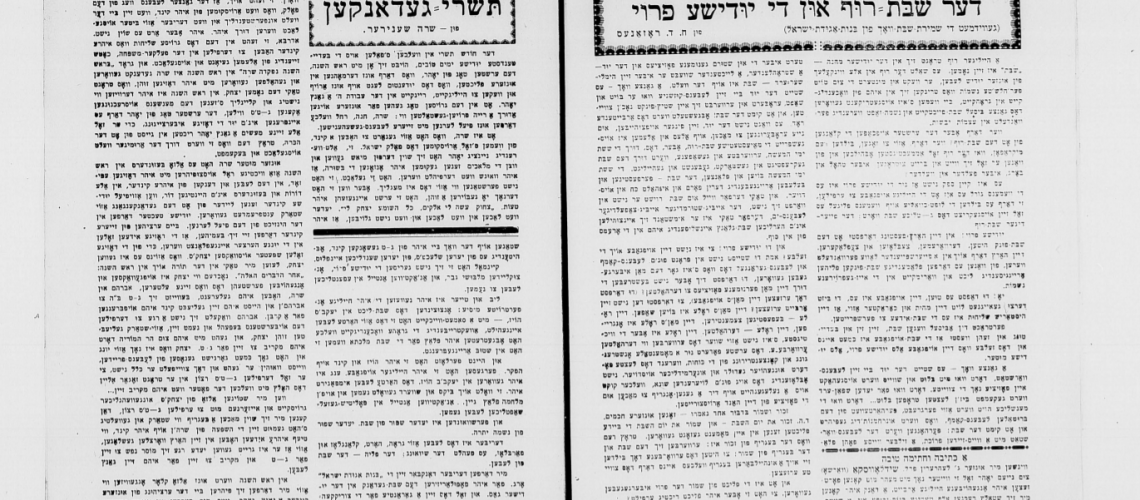In the 35th issue (1928) of the Bais Yaakov Journal, Sarah Schenirer wrote about Tishrei in a column titled:
תשרי-געדאנקען - Tishrei Thoughts
Below is a translation of Sarah Schenirer’s words by Sandra Chiritescu.
 The month of Tishrei during which the most important Jewish holidays fall, begins with Rosh Hashone, the first day of the new year. That day must remind us of the duties that Judaism imposes upon us, and rouse holiness and purity in our service for G-d for the entire year. On exactly that grand day a number of women pass by before our eyes such as: Sarah, Chana, and Rachel who teach us much through their life experiences.
The month of Tishrei during which the most important Jewish holidays fall, begins with Rosh Hashone, the first day of the new year. That day must remind us of the duties that Judaism imposes upon us, and rouse holiness and purity in our service for G-d for the entire year. On exactly that grand day a number of women pass by before our eyes such as: Sarah, Chana, and Rachel who teach us much through their life experiences.
There is Sarah who so strongly longed to have a child from which the people of Israel should spring forth. She was already 90 years old and had given up hope when the angels came to her and announced that her wish would be fulfilled, but she laughed. She didn’t understand how that could be possible, but when she later did give birth to a son she saw her mistake. “God has brought me laughter; everyone who hears will laugh with me.” Everyone will laugh and laugh, and won’t believe that her great wish was fulfilled in such an unnatural way. She also saw that the world will not comprehend the journey of the people who will spring forth from her child and will bitterly laugh at them. She was no longer bothered by it, however. Of course she saw the great mission her children have to fulfill within the family of different peoples, even if everyone persecutes and laughs at them. And exactly “on Rosh Hashone Sarah was remembered,” and she received help together with her son who carries the name Yitzhak. Rosh Hashone showed her how insignificant and petty human plans are vis-à-vis G-d’s will. The first day of the year must imprint this conviction on the Jew so that he shall adjust all his actions according to the spirit of this insight all year long, even if the world around him laughs at him and contests him.
Our matriarch Sarah therefore serves an important role – particularly through this story on Rosh Hashone – in the life and thought of her offspring, throughout all generations and especially in this current generation where so many Jewish children are so deeply alienated from such thoughts. Jewish daughters must learn a lot in this regard. In educating their children they must make an effort to implant these ideas in the young hearts so that they should grow into Yitzhaks. We read in the Torah, also on Rosh Hashone, what kind of a man Yitzhak was: “Some time afterward.” After Yitzhak grew up and began to understand what his parents Abraham and Sarah taught him, G-d appeared before Abraham and ordered him to offer his beloved son Yitzhak as a sacrifice. Abraham didn’t hesitate a second to fulfil G-d’s order and take his so-beloved son Yitzhak to the Har Hamoriah to offer him as a sacrifice to G-d. Yitzhak, who was still so young and had barely enjoyed life’s pleasures knew where he was headed, yet did not doubt at all whether he should fulfil G-d’s will and even carried the wood himself with which his father would sacrifice him…
When we are astounded by Yitzhak’s uncommon magnanimity and steadfast courage to fulfil G-d’s will, only then can we begin to understand how strong and powerful Sarah’s influence over her child must have been, how deeply her ideas must have taken root in his heart, in order for him to be ready at any moment to sacrifice his entire life for G-d.
Rosh Hashone clearly shows us how we must educate our children all year round, what we must plant in their hearts so that they are worthy of being the children of our great ancestors.
Let us truly learn from this all the more!
A song celebrating what our foremothers teach us, found in a Bais Yaakov Songbook and sung by the Bais Yaakov Choir / Kol Isha at YIVO on March 24, 2019.

Sandra Chiritescu is a PhD candidate in Yiddish Studies at Columbia University. She is writing her dissertation on Yiddish and second-wave feminism. She has previously translated Yiddish children’s stories for the volume In the Land of Happy Tears (Penguin Random House, 2018).

